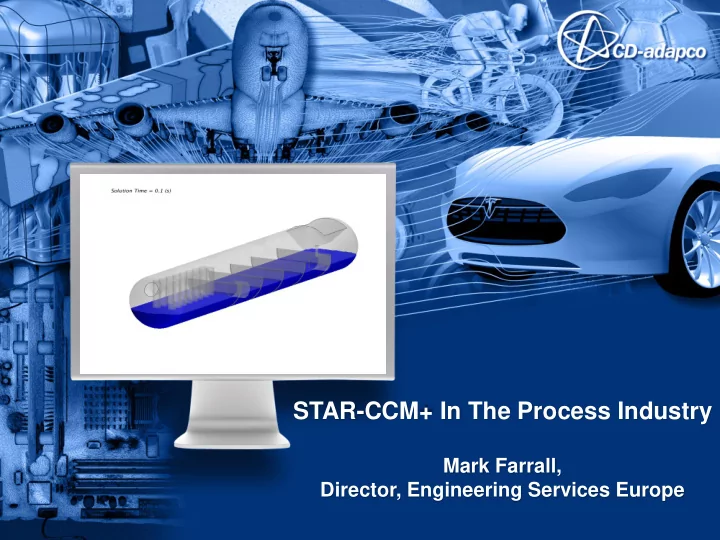

STAR-CCM+ In The Process Industry Mark Farrall, Director, Engineering Services Europe
Outline • Introduction to Engineering Services • Process Equipment: An Overview • Case Study – Flare Knock Out Drum • Case Study – Stabilizer Feed Drum • Case Study – Surge Sphere
Engineering Services: The Customer-Flexible Role We concentrate on the underlying need: what do “You” need to know or find out Jump Start In-house Analysis Capabilities Further advance In-house Analysis Capabilities • Where CD-adapco already knows how to do it • Where no one knows how to do it Validate/Evaluate the Software in “Your” Application Understand How a Current Product Works Support New Product Development Overcome Short Term Resource Needs Overcome Near Term Schedule Needs Team with CD-adapco in a Proposal to Make “ Your ” Services More Comprehensive to “Your” customers Fulfill a Contractual or Legal Requirement
Companies Helped By CD-adapco
Outline • Introduction to Engineering Services • Projects Work Areas • Process Equipment: An Overview • Case Study – Flare Knock Out Drum • Case Study – Stabilizer Feed Drum • Case Study – Surge Sphere
Project Work Areas • Onshore / Offshore Pipelines – Slugging – Chemical injection management – Investigation of the effects of Gas lift – Thermal Insulation (Start-up and Shut-down) – STAR-Olga coupled analyses Typic pical al tie ie-ba back ck in infras astru tructure ture
Project Work Areas • Vessels / FPSOs • Wave impact analysis • Sloshing in tanks / separators • Vessel Integrity Typic pical al tie ie-ba back ck in infras astru tructure ture
Project Work Areas • Safety – Flare radiation – Gas dispersion / Re-ingestion – Free Falling Life Boats Typic pical al tie ie-ba back ck in infras astru tructure ture
Outline • Introduction to Engineering Services • Process Equipment: An Overview • Case Study – Flare Knock Out Drum • Case Study – Stabilizer Feed Drum • Case Study – Surge Sphere
Areas Of Interest • Design Verification - Separation performance – Liquid carry over – Liquid carry under – Sloshing – Effectiveness of baffles – Vessel Integrity
Areas Of Interest • Design Verification - Separation performance – Liquid carry over – Liquid carry under – Sloshing vessels • Resolving Current Issues – Under performance – Operational Issues
Outline • Introduction to Engineering Services • Process Equipment: An Overview • Case Study – Flare Knock Out Drum • Case Study – Stabilizer Feed Drum • Case Study – Surge Sphere
Flare Knock Out Drum • Motivation: Oil carry-over from the Knock-Out Flare Drum during flaring. The liquid level inside the vessel was observed to drop during flaring events. Further indicators of this came from a temperature increase in the vessel. Heavier hydro-carbons can produce a diesel “sheen” on the surrounding sea after flaring. Lighter hydro -carbons can sometimes produce a “burning rain” from partially burnt oil. • Solution: Multiphase model of the Knock-Out Flare Drum to identify cause of carry-over; Identify potential design solutions. • Business Benefit: Oil carry-over can lead to poor combustion and resultant damage to the flare tip. Liquid level dropping can trip the level alarm which shuts down production.
Operations Data Decrease in liquid level Flare event: Increase in gas flow
Flare Knock Out Drum Gas Inlet Pipe: Gas Outlet Pipe Fixed mass inlet Baffle Plate Liquid Outlet Pipe: Wall (closed)
Original Design Inlet gas flow is directed downwards onto the liquid surface where it creates a large standing wave.
Design Variations Flat plate perpendicular to the inlet ducting Flat plate angled towards the upper surface of the vessel
Design Variations Saucer perpendicular to the inlet ducting Vertical half pipe
Design Variations Horizontal half pipe Convex plate
Final Design The new concave plate design directs the flow to the sides of the drum and then downwards. When the inlet gas stream reaches the liquid surface it has lower velocity and is directed more horizontally than the original design. Only small waves are generated
Carry Over Comparison
Outline • Introduction to Engineering Services • Process Equipment: An Overview • Case Study – Flare Knock Out Drum • Case Study – Stabilizer Feed Drum • Case Study – Surge Sphere
Stabilizer Feed Drum • Motivation: Condensate carry-under from the Stabilizer Feed Drum • Solution: Multiphase model of the Stabilizer Feed Drum to identify cause of carry-under; Identify potential design solutions; Qualitative flow field comparisons; Quantitative carry-over comparisons • Business Benefit: Vessel out of use Gas Outlet Inlet Pipe Inlet Pipe Vane Pack Diffuser Vortex Weir Plate Breaker Glycol Vane Unit Outlet Condensate Outlet Boot
Flow Field Overview Liquid hydrocarbons present in the boot section
Flow Field Overview • The gas exiting the inlet device impacts the liquid surface and moves around the upstream part of the vessel. • As the vane pack covers only have the vessel height the gas flows over the top and down, generating a large recirculation zone in the main part of the vessel. • Chance for surface entrainment leading to liquid carry over Gas Recirculation Zone
Alternative Internals Arrangement Original Configuration Modified Configuration Glycol / Condensate Interface raised 50mm Modified Weir Plate: Distributor Plate
Flow Field Comparison Original Configuration Modified Configuration
Flow Field Comparison Original Configuration Reduced Improved flow through recirculation the vane unit zones Modified Configuration
Carry-over Quantification: Droplet Diameter 0.1mm Volume Fraction of Oil Original Configuration Modified Configuration
Recommend
More recommend